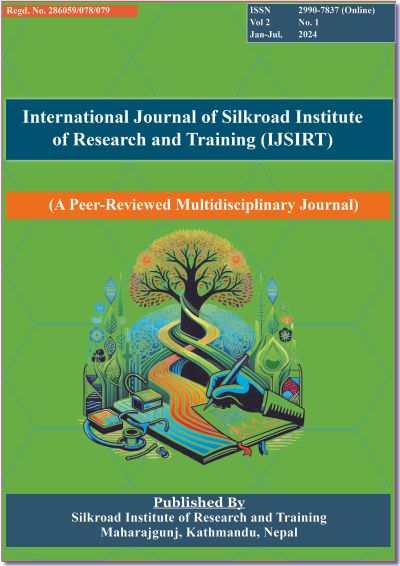Quackery: A Major Persisting Issue in the Dental Profession of Nepal
DOI:
https://doi.org/10.3126/ijsirt.v1i2.67651Keywords:
quackery, dental profession, Nepal, patient safety, healthcare regulation, public awarenessAbstract
Background: Quackery in the dental profession is a significant and persistent issue in Nepal, particularly in urban areas like Hetauda city. This practice involves the provision of dental services by individuals lacking formal education, training, or licensing, posing serious risks to patient health and safety. Objective: This study aims to assess the prevalence of quackery in Hetauda city, Nepal, and its implications for dental care quality and patient safety. It also seeks to understand the reasons behind patients’ continued use of unlicensed dental practitioners and to provide recommendations for addressing this issue. Methods: A cross-sectional study was conducted in 25 dental clinics across Hetauda city. Data collection included structured interviews with licensed dental practitioners, patient surveys, and observational assessments of clinic operations and infection control practices. Quantitative data were analyzed using descriptive statistics, while qualitative data from interviews were thematically analyzed. Results: The study found that 28% of the surveyed clinics employed unlicensed practitioners. Clinics with quacks exhibited significantly lower standards of care, including inadequate infection control and improper procedures. Only 30% of patients were aware of their dental care providers' qualifications, with many opting for quacks due to affordability and accessibility. A higher incidence of complications and adverse outcomes were reported among patients treated by unlicensed practitioners. Qualitative findings highlighted patient trust in quacks, frustrations of licensed practitioners, and regulatory gaps. Conclusion: Quackery remains a major issue in the dental profession in Hetauda city, Nepal. Addressing this problem requires a multifaceted approach, including improved regulation, increased public awareness, and stringent enforcement of licensing standards. Ensuring that all dental practitioners are properly qualified and licensed is essential for protecting patient safety and maintaining the credibility of the dental profession in Nepal.
Downloads
Downloads
Published
How to Cite
Issue
Section
License
Copyright (c) 2024 Priyanka Poudel, Roshan kumar Roy, Lalan Kumar Mahato, Purushottam Panday, Sharah Mehnaz Meghla

This work is licensed under a Creative Commons Attribution-ShareAlike 4.0 International License.
CC BY-SA: This license allows reusers to distribute, remix, adapt, and build upon the material in any medium or format, so long as attribution is given to the creator. The license allows for commercial use. If you remix, adapt, or build upon the material, you must license the modified material under identical terms.




